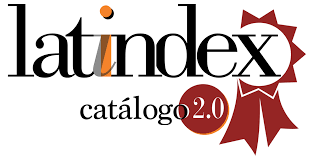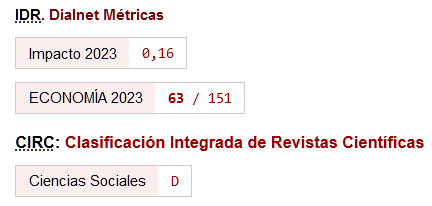Pluriverse: horizons for a civilizational transformation
DOI:
https://doi.org/10.46661/rec.10143Keywords:
degrowth, buen vivir, ecofeminism, transition, socio-ecological transformationAbstract
This article lays out both a critique of the oxymoron "sustainable development", and the potential and nuances of a Post-Development research agenda for a civilizational transformation. We present and discuss three examples of alternatives to development: ecological swaraj from India, buen vivir from the Amazonian and Andean indigenous world of Latin America and Degrowth from Europe. This gives a hint of our book titled Pluriverse: The Post-Development Dictionary (AUF, 2019), that is meant to deepen and widen a research, dialogue and action agenda for activists, policymakers and scholars on a variety of worldviews and practices relating to the collective search for an ecologically wise and socially just world. This volume could be one base in the search for alternatives to United Nations' 2030 Agenda for Sustainable Development, in an attempt to truly transform the world. In fact, it is an agenda towards the "Pluriverse": "a world where many worlds fit", as the Zapatistas say.
Downloads
References
Acosta, Alberto (2012): El Buen Vivir Sumak Kawsay, una oportunidad para imaginar otros mundos, Quito: Abya-Yala.
Acosta, Alberto (2016): Las dependencias del extractivismo - Aporte para un debate incompleto, Revista Aktuel Marx N° 20, Santiago de Chile: Nuestra América y la Naturaleza.
Acosta, Alberto y Brand, Ulrich (2018): Salidas del laberinto capitalista -Decrecimiento y Postextractivismo, Quito: Fundación Rosa Luxemburg.
D'Alisa, Giacomo; Demaria, Federico; Kallis, Giorgos (2015): Decrecimiento: Vocabulario para una Nueva Era, Barcelona: Icaria Editorial.
Dearden, Nick (2014): 'Is development becoming a toxic term?' The Guardian, 22/01/2014, http:// www.theguardian.com/global-development-professionals-network/2015/jan/22/development-toxicterm? CMP=share_btn_tw
Demaria, Federico; Schneider, Francois; Sekulova, Filka; Martinez-Alier, Joan (2013): 'What is degrowth? From an activist slogan to a social movement', Environmental Values Nº 22, pp. 191-215.
https://doi.org/10.3197/096327113X13581561725194 DOI: https://doi.org/10.3197/096327113X13581561725194
Escobar, Arturo (1995): Encountering Development, Princeton: Princeton University Press.
Escobar, Arturo (2011): Sustainability: Design for the pluriverse. Development Nº 54(2), pp. 137-140.
https://doi.org/10.1057/dev.2011.28 DOI: https://doi.org/10.1057/dev.2011.28
Escobar, Arturo (2015): Degrowth, postdevelopment, and transitions: a preliminary conversation. Sustainability Science Nº 10(3), pp. 451-462.
https://doi.org/10.1007/s11625-015-0297-5 DOI: https://doi.org/10.1007/s11625-015-0297-5
Gómez-Baggethun, Erik; Naredo, Jose Manuel (2015): In search of lost time: the rise and fall of limits to growth in international sustainability policy. Sustainability Science Nº 10(3), pp. 385-395.
https://doi.org/10.1007/s11625-015-0308-6 DOI: https://doi.org/10.1007/s11625-015-0308-6
Gudynas, Eduardo; Acosta, Alberto (2011): La renovación de la crítica al desarrollo y el buen vivir como alternativa, Utopia y Praxis Latinoamerica Nº 16(53), pp. 71-83.
Gudynas, Eduardo (2011): Buen vivir: today's tomorrow, Development Nº 54(4), pp. 441-447.
https://doi.org/10.1057/dev.2011.86 DOI: https://doi.org/10.1057/dev.2011.86
Hornborg, Alf (2009): 'Zero-sum world', International Journal of Comparative Sociology Nº 50(3-4), pp. 237-262.
https://doi.org/10.1177/0020715209105141 DOI: https://doi.org/10.1177/0020715209105141
Inglehart, Ronald (1990): Culture Shift in Advanced Industrial Societies, Princeton: Princeton University Press.
https://doi.org/10.1515/9780691186740 DOI: https://doi.org/10.1515/9780691186740
Kallis, Giorgos (2015): 'The Degrowth alternative', Great Transition Initiative, http://www.greattransition.org/publication/the-degrowth-alternative.
Kothari, A. (2013): Missed Opportunity? Comments on two global reports for the post-2015 goals process, Pune: Kalpavriksh and ICCA Consortium, 2013. http://www.un-ngls.org/IMG/pdf/Kalpavriksh_and_ICCA_Consortium_-_Post-2015_reports_critique_-_Ashish_Kothari_July_2013.pdf
Kothari, A. (2014): Radical ecological democracy: A way for India and beyond, Development, 57(1), pp. 36-45.
https://doi.org/10.1057/dev.2014.43 DOI: https://doi.org/10.1057/dev.2014.43
Kothari, Ashish; Demaria, Federico; Acosta, Alberto (2015): Buen vivir, degrowth and ecological swaraj: alternatives to development and the green economy. Development Nº 57(3), pp. 362-375.
https://doi.org/10.1057/dev.2015.24 DOI: https://doi.org/10.1057/dev.2015.24
Kothari, Ashish; Salleh, Ariel; Escobar, Arturo; Demaria, Federico; Acosta, Alberto (2019): Pluriverso: Un diccionario del posdesarrollo. Barcelona: Icaria Editorial.
Kothari, Ashish; Salleh, Ariel; Escobar, Arturo; Demaria, Federico; Acosta, Alberto (2019): Pluriverse: A Post-Development Dictionary. Delhi / New York: AUF - Tulika / Columbia University Press.
Latouche, Serge (2009): Farewell to Growth, London: Polity.
Martinez-Alier, Joan (2002): The Environmentalism of the Poor: A Study of Ecological Conflicts and Valuation, Cheltenham: Edward Elgar.
https://doi.org/10.4337/9781843765486 DOI: https://doi.org/10.4337/9781843765486
Meadows, Donella H.; Meadows, Dennis L.; Randers, Jørgen; Beherns III, William W. (1972): The Limits to Growth, New York: Universe Books.
Metz, Thaddeus (2011): Ubuntu as a moral theory and human rights in South Africa. African Human Rights Law Journal Nº 11(2), pp. 532-559.
Mies, Maria (1986): Patriarchy and Accumulation on a World Scale, London: Zed Books.
Mies, Maria; Bennholdt-Thomsen, Veronika (1993): The Subsistence Perspective, London: Zed Books.
New Economic Foundation, NEF (2008): A Green New Deal: Joined-up policies to solve the triple crunch of the credit crisis, climate change and high oil prices. Green New Deal Group, New Economics Foundation, Available at http://b.3cdn.net/nefoundation/8f737ea195fe56db2f_xbm6ihwb1.pdf.
Naciones Unidas (2015): Transformar nuestro mundo: la Agenda 2030 para el Desarrollo Sostenible, Naciones Unidas.
Naredo, José Manuel (1987): La economía en evolución. Historia y perspectivas de las categorías básicas del pensamiento económico, Madrid: Siglo XXI de España.
Naredo, José Manuel (2015): Raíces económicas del deterioro ecológico y social. Más allá de los dogmas, Madrid: Siglo XXI de España.
Naredo, José Manuel (2011): Reflexiones sobre la bandera del decrecimiento. Viento Sur 118. Disponible: http://www.elrincondenaredo.org/Biblio-2011-Reflexiones%20sobre%20la%20bandera%20del%20decrecimiento.pdf
Pérez Orozco, Amaia (2014): Subversión feminista de la economía: aportes para un debate sobre el conflicto capital-vida. Madrid: Traficantes de Sueños.
Poerksen, Uwe (2004): Plastic Words: The Tyranny of a Modular Language, Penn State University Press.
Quijano, Aníbal (2014): Cuestiones y Horizontes - Antología Esencial - De la dependencia histórica-estructural a la colonialidad/decolonialidad del poder. Buenos Aires: CLACSO.
Ramírez-Cendrero, Juan Manuel (2017): Limites y contradicciones del postdesarrollismo como inspiración heterodoxa frente al desarrollo capitalista. Revista de Economía Critica Nº 24, pp. 20-35.
Rahnema, Majid; Bawtree, Victoria (1997): The Post-Development Reader. London: Zed Books.
Rist, Gilbert (2003): The History of Development: From Western Origins to Global Faith, Expanded Edition, London: Zed Books.
Sachs, Wolfgang (1996): Diccionario del desarrollo. Una guía del conocimiento como poder, PRATEC, Perú, (primera edición en inglés en 1992).
Salleh, Ariel (1997): Ecofeminism as Politics. London: Zed Books / New York: Palgrave.
SDSN (2013): An Action Agenda for Sustainable Development, Report for the Secretary General, Sustainable Development Solutions Network.
Shiva, Vandana (1989): Staying Alive: Women, Ecology and Development, London: Zed Books.
Shrivastava, Aseem; Kothari, Ashish (2012): Churning the Earth: The Making of Global India, Delhi: Penguin Books India.
Sousa Santos, Boaventura (2009): A Non-Occidentalist West? Learned Ignorance and Ecology of Knowledge. Theory, Culture and Society Nº 26(7-8), pp. 103-125.
https://doi.org/10.1177/0263276409348079 DOI: https://doi.org/10.1177/0263276409348079
Swyngedouw, Erik (2007): 'Impossible/undesirable sustainability and the post-political Condition', en J.R. Krueger and D. Gibbs (eds.), The Sustainable Development Paradox, New York: Guilford Press, pp. 13-40.
Tortosa, Jose Manuel (2011): Mal desarrollo y mal vivir - Pobreza y violencia escala mundial, en Acosta, Alberto y Martínez, Esperanza (editores), Serie Debate Constituyente, Quito: Abya-Yala.
Trainer, Ted (1985): Abandon Affluence!, London: Zed Books.
UNEP (2011): Towards a Green Economy: Pathways to Sustainable Development and Poverty Eradication, A Synthesis for Policy Makers, Nairobi: United Nations Environment Programme, www.unep.org/greeneconomy
United Nations (2013): A New Global Partnership: Eradicate Poverty and Transform Economies Through Sustainable Development, The Report of the High-Level Panel of Eminent Persons on the Post-2015 Development Agenda, New York: United Nations.
United Nations (2015): Transforming our World: The 2030 Agenda for Sustainable Development, New York: United Nations. Disponible en: https://sustainabledevelopment.un.org/post2015/transformingourworld/publication
United Nations Secretary-General's High-level Panel on Global Sustainability (2012): Resilient People, Resilient Planet: A future worth choosing, New York: United Nations.
Ziai, Aram (2015): Post-development: Pre-mature burials and haunting ghosts, Development and Change Nº 46(4), pp. 833-854.
https://doi.org/10.1111/dech.12177 DOI: https://doi.org/10.1111/dech.12177
Downloads
Published
How to Cite
Issue
Section
License
Copyright (c) 2021 Federico Demaria, Alberto Acosta, Ashish Kothari, Ariel Salleh, Arturo Escobar

This work is licensed under a Creative Commons Attribution 4.0 International License.
This licence allows third parties to share (copy and redistribute the material in any medium or format) and adapt (remix, transform and create from the material for any purpose, including commercial purposes), provided that authorship and first publication in this journal (The Journal, DOI of the work) is acknowledged, a link to the licence is provided, and it is stated whether changes have been made to the work.







